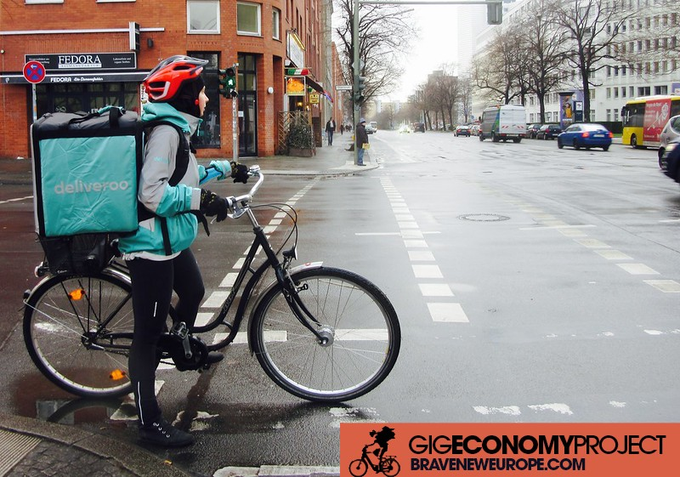This is the first time that workers have influenced the IPO of a platform economy company, also thanks to the Uber judgement at the British Supreme Court.
The Gig Economy Project, led by Ben Wray, was initiated by BRAVE NEW EUROPE enabling us to provide analysis, updates, ideas, and reports from all across Europe on the Gig Economy.
This series of articles concerning the Gig Economy in the EU was made possible thanks to the generous support of the Foundation Menschenwürde und Arbeitswelt


Deliveroo’s £1 billion IPO downgrade: gig worker exploitation puts off investors
Deliveroo, the UK-based food delivery platform part-owned by Amazon, has downgraded its expectations ahead of the start of the company’s IPO on Wednesday [31 March], following a storm of criticism over workers’ rights.
The company announced that it was now expecting its shares to sell for less than it estimated last week, downgrading its top end valuation from £8.8 billion to £7.85 billion.
The downgrade followed a week of tough press attention, after an investigation by Bureau Local revealed that one in three delivery riders earn on average less than the UK minimum wage. The investigation analysed thousands of invoices from more than 300 riders.
Following the revelation, Marcus Rashford, the Manchester United footballer who has become a leading campaigner against child poverty in the UK, contacted Deliveroo for emergency talks. Deliveroo is a backer of Rashford’s End Child Poverty Taskforce and is the chief sponsor of England’s football team.
The criticism was heard in the boardrooms of some of the UK’s largest financial investors, including Aberdeen Standard, Aviva Investors, BMO Global, CCLA, LGIM and M&G, which announced that they would be boycotting the Deliveroo IPO over workers’ rights concerns.
One investor, Rupert Krefting head of corporate finance and stewardship at M&G, told the BBC that the recent UK Supreme Court verdict, which found Uber drivers are workers, represented a financial risk for Deliveroo, which relies on a similar gig economy model of work.
“Deliveroo’s narrow profit margins could be at risk if it is required to change its rider benefits to catch up with peers,” Krefting said.
Another investor, Phil Webster, portfolio manager at BMO, said labour classification was a “ticking time bomb” for the company.
Deliveroo, which according to one study is the most protested against digital platform in the world, warned potential investors in its IPO prospectus that it did face litigation risks over workers’ rights, and had set aside £112 million to cover potential legal costs.
The company stated that they “would be adversely affected if our rider model or approach to rider status and our operating practices were successfully challenged or if changes in law require us to reclassify our riders as employees.”
It has already faced defeat in a Dutch Supreme Court verdict which ruled in February that Deliveroo riders should be considered workers. A Barcelona court also came to the same conclusion in January, demanding the company gives employment contracts to 748 riders in the city.
The company also faces the possibility of regulatory changes. Deliveroo operates in eight European countries and the EU Commission is currently drawing a Directive to regulate platform work. The company has never recorded a profit, though claims to be operating profitably now, and the additional labour costs which would surely come from proper regulation of the gig economy could be seen as a major financial risk.
Deliveroo’s IPO on Wednedsay is still expected to be one of the biggest-floats in the past decade on the London market, and will net its CEO Will Shu hundreds of millions.
The IWGB union has called a strike of Deliveroo riders in the UK for 7 April, the day unconditional trading begins on Deliveroo’s IPO, and have launched a strike hardship fund for workers.
The union has also published a Deliveroo investor briefing alongside ShareAction and The Private Equity Stakeholder Project.
“The Covid-19 crisis has brought to the forefront significant issues which face Deliveroo riders which includes low pay, insecure work, safety concerns and widespread discontent,” the investor briefing states.
“While gaining due recognition as ‘key workers’ for the value they contribute to society, many riders have struggled financially through the pandemic.
“These concerns are contributing to a number of significant risks to both the company and investors alike, most significantly, litigation risks but also including reputational and financial risks.”



Be the first to comment